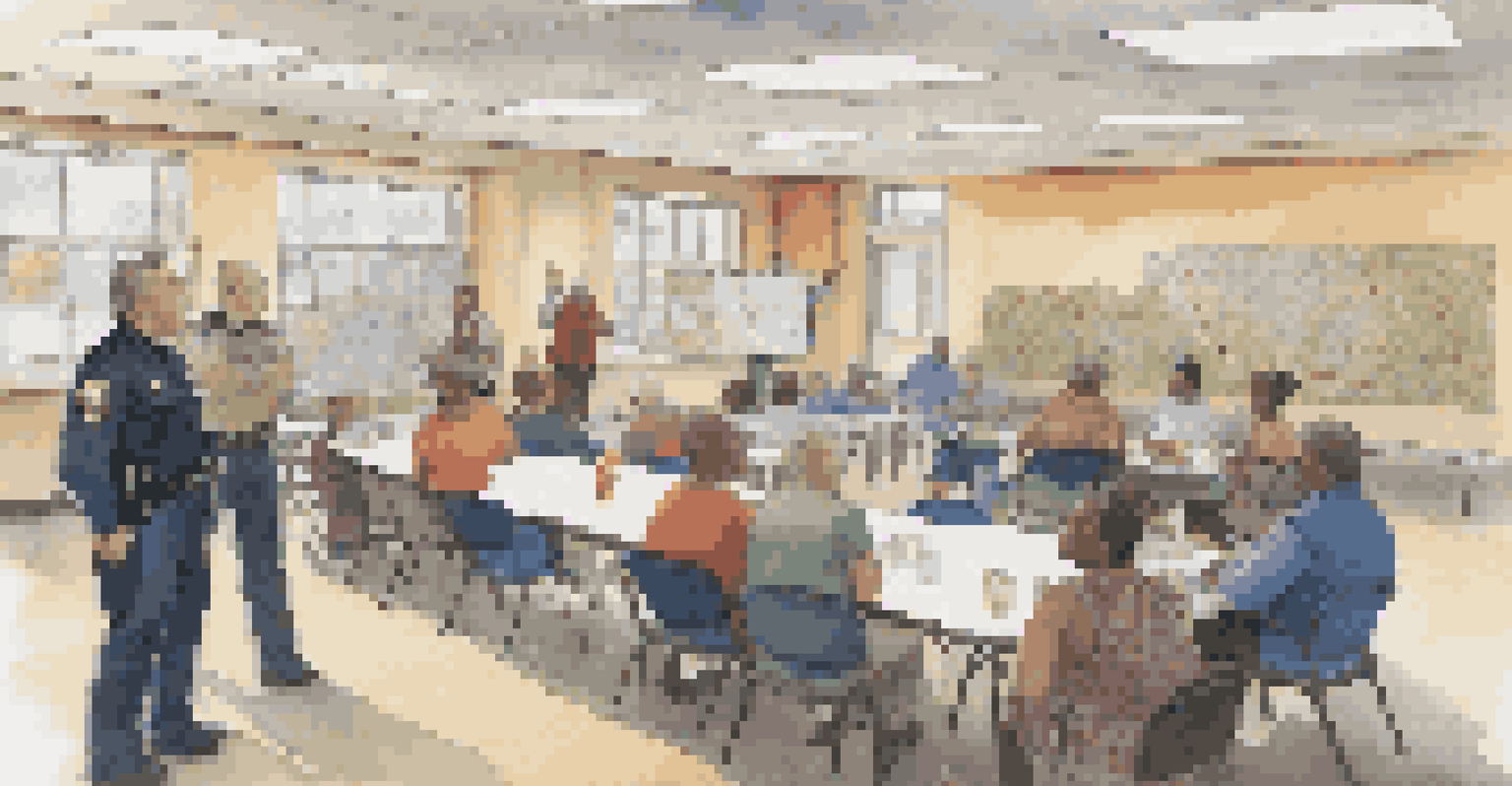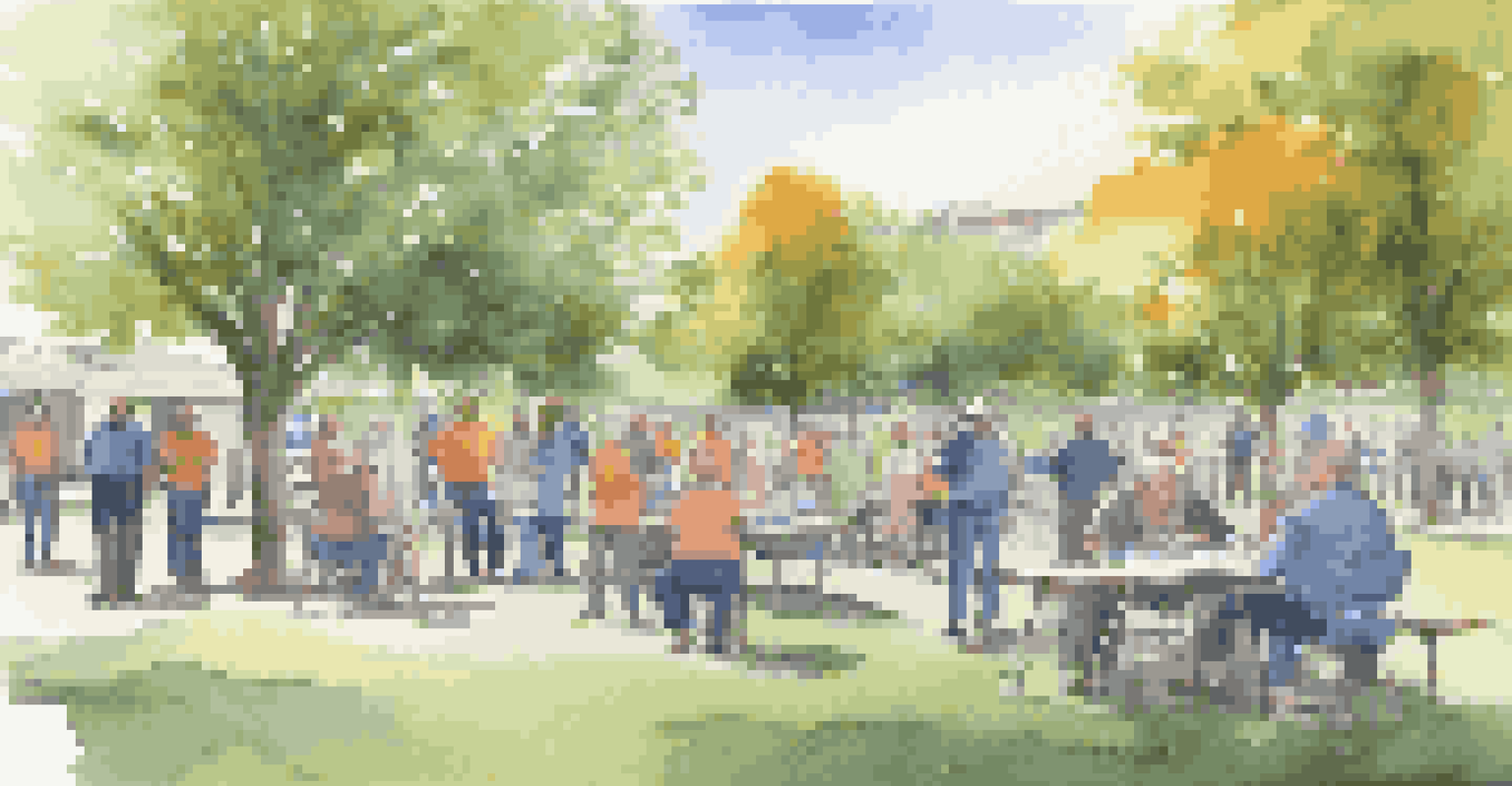How Community Resources Can Enhance Home Security

Understanding the Role of Community in Home Security
Community plays a crucial role in enhancing home security. When neighbors look out for each other, it creates a supportive environment that deters crime. Think of it like a safety net; the more people involved, the stronger it becomes.
Alone we can do so little; together we can do so much.
When residents are engaged in their neighborhoods, they tend to notice unusual activities. This awareness can lead to quicker responses to potential threats, as people feel a sense of responsibility for one another's safety. It’s like having a group of watchful eyes, always alert and ready.
Involving the community in home security fosters a collaborative spirit. By working together, residents can share information, tips, and resources that benefit everyone. This shared approach can significantly reduce crime rates in the area.
Neighborhood Watch Programs: A Collective Effort
Neighborhood watch programs are one of the most effective community resources for enhancing security. These programs encourage residents to keep an eye on each other’s properties and report suspicious activities. It’s like having a mini-police force made up of your neighbors.

Joining or forming a neighborhood watch can lead to stronger relationships among residents. Regular meetings create opportunities for neighbors to connect, share concerns, and strengthen their community ties. This sense of unity can make a neighborhood less appealing to criminals.
Moreover, neighborhood watch programs often collaborate with local law enforcement. This partnership helps residents learn about crime prevention techniques while also receiving support from police. Together, they form a powerful alliance against crime.
Utilizing Social Media for Community Safety
In today's digital age, social media has become a vital tool for enhancing home security. Local community groups on platforms like Facebook or Nextdoor allow residents to communicate quickly and effectively. Sharing information about suspicious activities or safety tips has never been easier.
The greatness of a community is most accurately measured by the compassionate actions of its members.
These online platforms create a space where neighborhood concerns can be shared and addressed promptly. Imagine posting about a suspicious vehicle in your area and receiving immediate feedback or updates from fellow residents. The collective awareness can lead to proactive measures that keep everyone safe.
Additionally, social media can be a place for organizing community events focused on safety, such as workshops or training sessions. By bringing residents together both online and offline, communities can cultivate a culture of vigilance and support.
Local Law Enforcement: Building Stronger Partnerships
Establishing a good relationship with local law enforcement can greatly enhance home security. Many police departments offer community policing programs that encourage collaboration between officers and residents. This partnership helps build trust and ensures that community concerns are heard.
Regular meetings with law enforcement can provide valuable insights into crime trends and prevention strategies. Officers can share tips on securing homes and neighborhoods, helping residents understand the best practices for safety. It's like having a personal security consultant right in your community.
Moreover, when residents and police work together, it fosters a sense of community pride and responsibility. A united front against crime sends a clear message that the neighborhood will not tolerate unlawful activities, making it a less attractive target for criminals.
Community Events: Strengthening Neighborhood Bonds
Community events play a significant role in enhancing home security by bringing residents together. Activities like block parties or neighborhood clean-ups foster relationships and build trust among neighbors. The stronger the bonds, the more likely residents are to look out for one another.
These gatherings also provide an opportunity to discuss safety concerns and share information about local resources. Residents can exchange tips on securing their homes, as well as discuss any recent incidents in the area. It creates a forum for open communication, which is vital for community safety.
Furthermore, community events can serve as a platform to invite local law enforcement to engage with residents. This not only strengthens relationships but also allows officers to offer safety demonstrations and resources, further enhancing the neighborhood's security.
Resource Sharing: Tools for Enhanced Home Security
Communities can enhance home security by sharing resources, such as security equipment or technology. For example, neighbors might purchase security cameras or alarm systems together, reducing costs for everyone involved. This collective investment can increase the overall safety of the community.
Additionally, sharing knowledge about home security measures can empower residents. Workshops can be held to educate neighbors on effective security practices, such as how to properly lock doors or install motion sensor lights. Knowledge is power, and when shared, it benefits the entire community.
Furthermore, resource sharing can extend to emergency preparedness. Communities can come together to create emergency plans and supplies, ensuring that everyone knows what to do in case of a crisis. This preparedness not only enhances security but also builds resilience within the community.
Building a Culture of Vigilance and Support
Creating a culture of vigilance and support is essential for long-term home security. When residents prioritize safety and look out for one another, it sets a standard for the entire community. It’s about cultivating an atmosphere where everyone feels responsible for their neighbor's well-being.
Encouraging open communication about safety concerns can lead to quicker responses and solutions. When residents feel comfortable sharing their worries, they can work together to address issues before they escalate. This proactive approach can deter potential threats and foster a sense of security.

Ultimately, a culture of vigilance is built on trust and engagement. By nurturing these values, communities can create an environment where residents feel safe and supported. Investing in relationships and resources today will pay off in a more secure tomorrow.